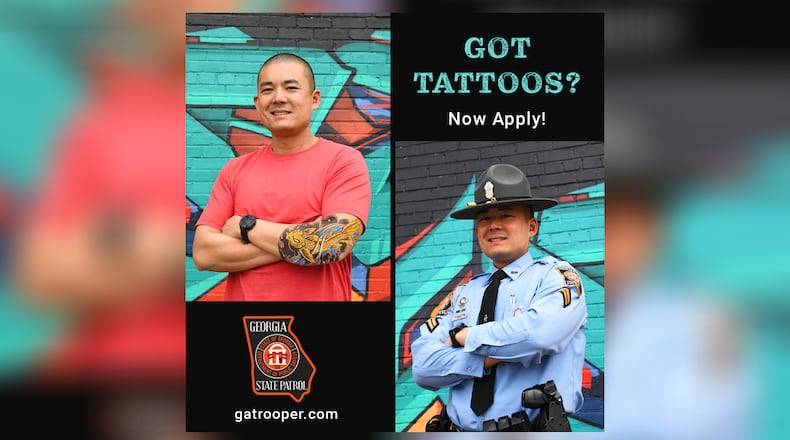Got ink? The Georgia State Patrol might just hire you anyway.
The Georgia Department of Public Safety has amended a long-standing policy prohibiting potential law enforcement officers with visible tattoos from applying to become state troopers.
Under the updated policy, which took effect last week, tattooed troopers are still required to keep their ink covered on the job, but they can now do so by wearing long-sleeve uniforms year-round.
Previously, officers wore long sleeves in the cooler months and switched to short-sleeve uniforms in the summer, said Lt. Auston Allen, recruiting coordinator for the Georgia State Patrol. The policy excluded many potential applicants, including tattooed military veterans and those with experience at other agencies.
“Ultimately, the Georgia State Patrol is trying to stay centered in a diverse world,” said Allen, who’s been with the department for nearly two decades. “We still have a tattoo policy, but it’s much more relaxed than it was.”
Department officials hope the change will help attract qualified recruits who were previously denied the chance to apply because of tattoos on their forearms. The new policy was unveiled last Friday in a series of social media posts featuring side-by-side photos of tatted-up troopers and motor carrier compliance officers both in and out of uniform.
“Got ink? We’re hiring,” the state agency said in a tweet that included a link to apply.
The move comes as a growing number of law enforcement agencies across the U.S. ease their previously stringent no-tattoo policies in the hopes of recruiting officers. Since the change was announced last week, Allen said he’s seen an uptick in the number of people applying to the State Patrol.
“With the ability to wear long-sleeve uniforms year-round, potential troopers that were previously disqualified because they had tattoos on their forearms can now join the department because those tattoos are obviously not visible,” he said.
Those with tattoos will still look professional at roadside traffic stops in their long-sleeve shirts and ties, Allen added.
In Cherokee County, the sheriff’s office changed its policy to allow deputies to show tattoos on their arms, agency spokesman Capt. Jay Baker said. Prior to the September 2018 change, deputies with visible arm tattoos had to keep them covered, even in the summer heat.
“We were thinking we might be excluding potential military applicants under the old policy, so we allowed for tattoos on the arms,” Baker said. Like the Georgia Department of Public Safety, the sheriff’s office still prohibits tattoos on the hands, face and neck.
In Marietta, there’s a growing number of officers with visible tattoos since the city’s police department relaxed its policy several years ago, spokesman Officer Chuck McPhilamy said. Many of them happen to be military vets.
“People get out of the military, and as part of a rite of passage, they will often get tattoos that they are fiercely proud of,” McPhilamy said. “It sort of flies in the face of that (when) we were saying they couldn’t have those tattoos.”
Tattoos considered offensive or controversial are prohibited on Marietta’s police force, and officers with large tattoos such as full sleeves must get department approval, McPhilamy said.
“We have seen an increase in the number of officers that have tattoos and we have heard our officers express appreciation for the change in policy,” he said.
Allen said allowing troopers with tattoos has widened the candidate pool and will hopefully help fill vacancies.
“Since the policy went into effect last week, there’s been a substantial increase in applicants,” he said. “Now that we can wear long sleeves year-round, (tattoos) are not a factor.”
About the Author
Keep Reading
The Latest
Featured




